“Think globally, act locally.”
When it comes to dining services on a university campus, such as UAB, one local sustainability initiative can make a huge impact on the environment. Take for example, plastic straws.
Plastic straws have become a hot topic because they are not recyclable and harm wildlife. However, now there are plant-based biodegradable alternatives. This past Fall, most UAB Dining Services vendors replaced their plastic straws with eco-friendly products, while also encouraging students to reduce their use of straws. According to a UAB survey, in the first two and half months, over 250,000 plastic straws were replaced.
That is the power of acting locally.
Food and Dining Strategic Plan
This past Fall, UAB launched a new sustainability strategic plan that will transform the university’s academic and medical campus by the year 2025. In the area of food and dining, the overarching aim is to support environmentally responsible dining operations, minimize food waste, and support local and sustainable food production.
“This element of the sustainability plan is one of our most exciting, said Julie Price, manager of UAB Sustainability. In collaboration with Sodexo, our campus food services management company and their hundreds of vendors, the list of possible initiatives is endless.”

Meet UAB’s Brian Bowser
Brian Bowser, UAB’s resident manager for campus dining, directs the on-campus food and dining sustainability initiative. Armed with 25 years of culinary experience, Bowser started his career as an executive chef. For the past 14 years, he has been managing campus dining programs across the country, culminating with his June 2018 arrival at UAB.
“My greatest joy is developing initiatives that meet and exceed the needs of our students, while also feeding students, faculty members and staff throughout UAB’s 100 city blocks. Food is my passion,” said Bowser.
Those needs include feeding approximately 110,000 to 125,000 meals a week, from 14 different dining venues across campus. On a normal Tuesday between 11:30 a.m. to 1:30 p.m., an average of 6,800 meals are served, according to campus statistics.
UAB’s Food and Dining Sustainability Initiatives
The development of the UAB’s food and dining sustainability initiatives are not done in a vacuum. Students, faculty, staff, administrators and vendors all play a role in the design of each initiative.
Here are 5 ongoing food and dining initiatives:
Reducing non-recyclable waste on campus – UAB has nearly eliminated all styrofoam on campus (which is not recyclable in Alabama). In October, they launched the paper straw campaign described above, replacing 250,000 plastic straws in the first two and half months, at all 14 locations.
“We have a very mobile campus. We have a lot of commuters, so one of the things we looked at was our packaging and to-go containers, reducing the non- recyclable materials,” added Bowser. “We introduced corn-based packaging and biodegradable material for all our partners (vendors). Panera has stepped up, and we (UAB) have become a showcase account for them. It shows the impact procurement can have on the community.”
Recycling bins and a zero waste facility – Working with UAB Facilities, all the venues have upgraded their recycling bins. At the UAB Commons, they are striving to be a zero-waste facility, one of the first of its kind in Alabama. Partnering with the Undergraduate Student Government Association, the Commons did a pilot composting collection and diverted over 600 pounds of compostable waste from landfills.
Blazer Catering and campus-wide post consumer materials – UAB’s “Blazer Catering Company” is breaking new ground in Birmingham. The university is the city’s first catering provider that provides 100% post-consumer recycled materials, including plates, utensils and napkins, for all of their events. UAB also gone to 100% post-consumer recycled materials at almost every single venue on campus.
Sustainable seafood and proteins – Working with over 127 vendors, UAB has already met its 2020 goals (a year ahead of schedule), to provide sustainable seafood and other proteins to students, faculty and staff. They have also secured non-GMO food items and increased their fair trade organic products by 16%.
Food Truck and cooking oil – Magic City Eats, the UAB Food Truck, offers Fair Trade menus, and all their packaging is from post-consumer recycled materials. They have added special plating to the bottom of the Food Truck to insure that they do not have grease or oil drips from the cooking equipment. Including oil from the food truck, every single drop of cooking oil that is produced on campus is collected to be re-used for biodiesel fuel.
An additional 15 sustainability initiatives, many of them student and faculty led, are under discussion or in the pipeline, according to Bowser.
By acting locally, may it be replacing plastic straws, converting cooking oils to biodiesel or using 100% post-consumer recyclable materials, UAB is setting the standard in Birmingham for sustainability.
UAB’s Price summed it up best, “Brian Bowser and the rest of the campus dining team are leading the effort to create an environmentally responsible dining program that will have positive impacts for environments, economies, and communities.”
Learn More
To learn more about UAB Sustainability Strategic Plan and UAB Sustainability visit their website at https://www.uab.edu/sustainability/